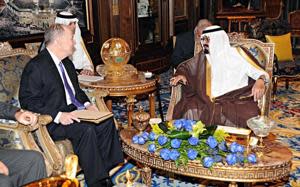 The Envoy
The EnvoySaudi Arabia’s King Abdullah sends private message to Obama

Saudi Arabia's King Abdullah has sent a private message to President Obama, The Envoy has learned.
The message was delivered to the White House by the Saudi ambassador to the United States, Adel A. Al-Jubeir, who returned to Washington from a trip to the oil-rich kingdom last week, a former senior US official told The Envoy on condition of anonymity.
The exact subject of the correspondence remained opaque, but it was described as concerning a Saudi diplomatic initiative--possibly on Syria. The message was also described as substantive and "close-hold," meaning not widely briefed beyond a small circle of senior officials.
The Saudi ambassador has since left Washington again, a second former senior US official who works on the region told The Envoy.
The White House declined to comment Tuesday.
The director of the Saudi embassy in Washington's information office, Nail Al-Jubeir, the ambassador's brother, told the Envoy by email Tuesday that he had just returned from holiday and did not immediately have any information on such a message, but would look into it.
American-Saudi bilateral relations have been recovering from a period of tension. Riyadh has been upset by the Arab Spring uprisings, and was horrified by Obama's call last February for Washington's ally of three decades, Egypt's Hosni Mubarak, to step down from power.
King Abdullah declined to meet with Defense Secretary Robert Gates and later Secretary of State Hillary Clinton when they were traveling in the region last March.
Relations have seemed to improve, however, since that low point. The Saudi king granted an audience to Gates in April before the Pentagon chief's retirement. He also met with Obama's National Security Advisor Tom Donilon for over two hours in April.
In that meeting, Donilon delivered a personal letter from Obama to the Saudi monarch, the Washington Post's David Ignatius reported in April. "The reassuring message ... was about 'the bond we have in a relationship of 70 years that's rooted in shared strategic interest,'" Ignatius wrote, citing Donilon's description of Obama's message to the king.
A former American diplomat said that Obama has also asked for greater Saudi contributions to help fund the Palestinian Authority, whose declared plans to seek statehood recognition from the United Nations later this month have sparked threats to cut-off US assistance from some members of Congress.
The Saudi monarch "may have responded to Obama's request for money for the PA, and he will no doubt have strong views about what's happening in Syria," the former diplomat said, adding that it's not so unusual for the king to pass messages to Washington through Al-Jubeir.
Washington Saudi analysts said the Saudi king trusts Amb. Al-Jubeir, who he promoted to ambassador from serving as the embassy's congressional liaison. King Abdullah prefers to conduct personal diplomacy with the White House sending discreet communications through his hand-picked envoy, rather than dealing with US diplomats posted to Riyadh.
"Given that the king is not a phone person and is still stung by Wikileaks, the shuttling is neither unusual nor surprising," one Washington Middle East analyst commented.
(The king's alleged reservations about normal diplomatic channels may have turned out to be vindicated. A July 2008 US diplomatic cable released by Wikileaks in recent days describes a medical evaluation of the Saudi monarch by a western physician said to have read Abdullah's medical file. "It was related that King Abdullah is 92 years old (born 1916), he remains a heavy smoker, regularly receives hormone injections and 'uses Viagra excessively,'" the cable, released by Wikileaks on September 1st, stated.)
Deputy Secretary of State Bill Burns is scheduled to visit Saudi Arabia in the next couple of weeks, an American official told The Envoy Tuesday, on condition of anonymity because the trip has not yet been announced.
